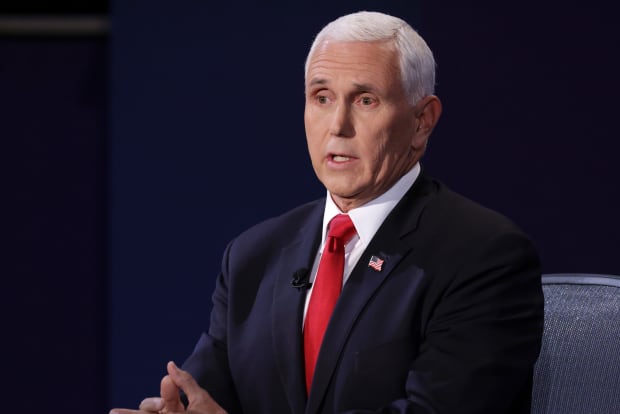This post was originally published on this site

U.S. Vice President Mike Pence debated Democratic vice presidential nominee Sen. Kamala Harris on the controversial practice of fracking and other climate-change policy proposals that divide the parties.
Alex Wong/Getty Images
The Joe Biden/Kamala Harris campaign has been treading carefully around the controversial process of fracking because of the jobs it provides in key swing states such as Pennsylvania.
Such care has earned the ticket criticism at times for lack of clarity, including in this Pittsburgh Post-Gazette editorial.
Vice President Mike Pence ventured to clear up his opponents’ position during Wednesday night’s debate. But his take, and an even harsher rehash by President Trump early Thursday, are not entirely accurate.
“This monster, she says no, no there won’t be fracking,” Trump said early Thursday of Harris when calling in to Fox Business a day after Pence claimed from the debate stage that his opponents would ban the drilling practice that has helped push the U.S. toward a more dominate position against global energy heavyweights Saudi Arabia and Russia, but has proven unstable at times.
“They want to bury our economy under a $2 trillion Green New Deal. [They] want to abolish fossil fuels, and ban fracking, which would cost hundreds of thousands of American jobs all across the heartland,” Pence said answering a debate question not on climate change but on the post-pandemic recovery.
Read: Here’s where Trump and Biden stand on climate change
“I will repeat, and the American people know, that Joe Biden will not ban fracking,” Harris answered Wednesday. “That is a fact.”
Biden hasn’t proposed banning fracking overall, rather new exploratory fracking on already protected land, but his campaign has had to clarify that position. The bulk of fracking, which uses high-pressure water to expel deep oil and creates the byproduct natural gas, takes place on private land. Biden also has not pushed abolishing fossil fuels in the near term, but has promoted a cleaner U.S. energy basket that will push the U.S. toward net-zero emissions by 2050, he claims.
Biden has at times latched onto the “Green New Deal” buzzwords, while also calling out his own policy differences from the aspirational framework that stalled in a divided Congress. One key difference is Biden’s willingness to keep some drilling in the mix alongside solar, wind and other energy generation.
Pence, his critics said, did not fully answer the question later on whether he thought climate change presented an existential threat requiring emergency action, reviving long-running criticism from some that the administration tacks toward climate-change “denial” despite the science around the topic and the position of key Republican lawmakers and mostly younger conservative voters who want a diverse energy mix that doesn’t favor fossil fuels.
One group, the right-leaning Citizens for Responsible Energy Solutions, said Pence’s willingness to address climate change is significant and that the country needs to move on measurable, reachable action.
“Republicans are asked time and time again whether they believe in some aspect of climate science in order to try and paint them as out of touch with the general public. Vice President Pence did not take the bait. He spoke plainly, eloquently, and honestly about American leadership in clean air, clean water, lowering emissions, improving our national parks, and bringing back American power in global energy markets,” said Heather Reams, executive director at CRES. “He talked about American innovation, fracking, and natural gas as key enablers for emissions reduction, and driving our leadership in climate change mitigation. “
Harris, meanwhile, her critics said, still wasn’t direct enough in talking about the Green New Deal, from her party’s more-progressive arm and drawn up in 2019 by Rep. Alexandria Ocasio-Cortez and Sen. Edward Markey. Some Pennsylvania voters interviewed Thursday morning by MSNBC said they feel Harris hasn’t be clear enough on fracking. Harris, before joining the Biden team, was a congressional sponsor of early versions of the Green New Deal.
The topic, just one piece of sweeping environmental policy, has found traction as the Nov. 3 election nears. The search phrase “What is fracking?” spiked by 4,150% in the first hour of the debate Wednesday, Google data showed. And U.S. search interest for the topic “Green New Deal” spiked 5,000%.
Fracking has contributed to plunging natural gas prices that save on energy costs for U.S. houses and businesses. But the extraction uses large amounts of water, which must be transported to the site. Some evidence points to increased earth tremors, while potentially carcinogenic chemicals may escape during drilling and contaminate groundwater.
Other climate issues continue to be informally debated, often outside of science and policy proposals. Some Republicans have also claimed that their rivals would ban noted emitters cows and planes, among other things, which is unfounded in the proposals advanced by Biden/Harris. Republicans say Democrats are generally too pessimistic, which slows action. The pressure is on both parties to lead as economic rival China has become more aggressive in its climate-change pledges, as have many major corporations, including Walmart WMT, +0.71%, and investing giants like BlackRock, in recent weeks and months.

